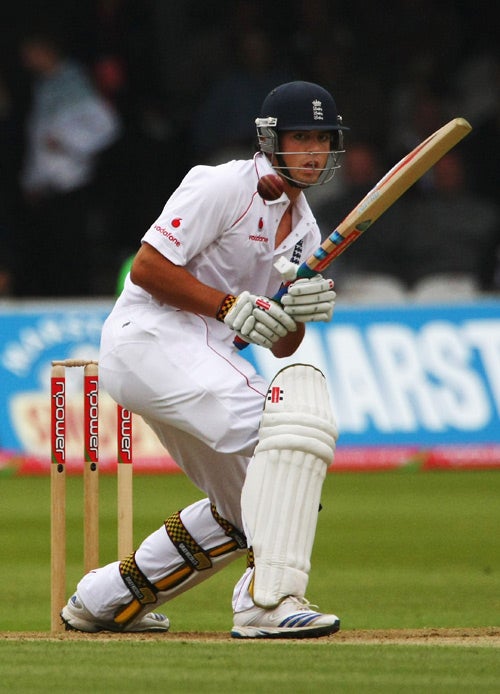Cook's return causes selection dilemma

Alastair Cook's return to fitness provides England's selectors with an intriguing dilemma as they contemplate their team for tomorrow's fourth NatWest Series match against New Zealand.
A shoulder injury prevented Cook from being considered for selection in the opening three matches and his recovery coincides with England's dreadful batting display in Bristol on Saturday, when they fell 22 runs short of the Black Caps modest total of 182. The choice of the selectors will give a strong indication of the tactics England want to employ as they attempt to find a formula that can win them a major limited over tournament.
Ian Bell and Luke Wright have opened the batting in England's four limited over games against New Zealand this summer with mixed results. In the Twenty20 international and first ODI Bell and Wright gave their side a reasonable start, compiling 48 and 49 for the first wicket. Both games were won. In the last two matches the pair have added nought and three whilst batting together, and but for the farce at Edgbaston both games would have been lost.
Cook is not a dasher, as a one-day strike rate of 68 - runs per 100 balls faced - suggests, but he is consistent. During the winter he was England's highest one-day run scorer in both Sri Lanka and New Zealand, scoring 339 runs in 10 matches.
The dilemma for England is do they return to the days when a steady but limited specialist Test opener was employed, or do they attempt to follow the example set by other countries, who position an attacking and powerful stroke-player at the top of the order? For the remaining two matches of the series they are likely to carry on as they are, with Bell and Wright looking to take the match to the opposition. But the pair need to offer more than they have to date if the tactic is to continue against South Africa, a stronger side than New Zealand, later in the summer.
England will be tempted to strengthen their bowling too now that Ryan Sidebottom has recovered from a stiff back. But whom will he replace? Stuart Broad and Chris Tremlett were excellent in Bristol, conceding just 38 runs in 20 overs. James Anderson, who leaked 61 valuable runs on Saturday, could be rested but he is England's most experienced bowler. With the Sir Allen Stanford $20 million match and Indian Premier League contracts on the horizon, no player will want to spend too much time on the sidelines.
A player who can expect to capitalise on all the money coming in to cricket is Mahendra Singh Dhoni, the Indian captain. Dhoni is in the process of replacing Sachin Tendulkar as India's most loved and marketable cricketer, and will therefore have a huge influence on the direction in which cricket heads over the next decade.
Dhoni, like several other leading players, believes that 50 over cricket could become a casualty as the demand for Twenty20 grows. “I think there is room for all three formats of the game,” said Dhoni at a press conference to promote next year's inaugural Twenty20 World Cup in England. “Test cricket is very different and has its own place. I don't see that changing and I am not worried about the future of Test cricket. People still see it as the top of the sport and it is so different from Twenty20 that I think it is safe.
“If there is one format that could suffer it is the 50-over game because it is more like Twenty20. It was brought in to make cricket quicker and more exciting but now Twenty20 has brought that to another level. It's over in three hours - it is like a movie for the whole family to enjoy. So ODIs could suffer but I hope not because I think 50-over cricket has a place of its own. In fact, I think Twenty20's influence on 50-over cricket has been positive overall. It has helped batsmen change their idea of what a good score is and it has made the cricket a lot more positive.”
Join our commenting forum
Join thought-provoking conversations, follow other Independent readers and see their replies
Comments
Bookmark popover
Removed from bookmarks